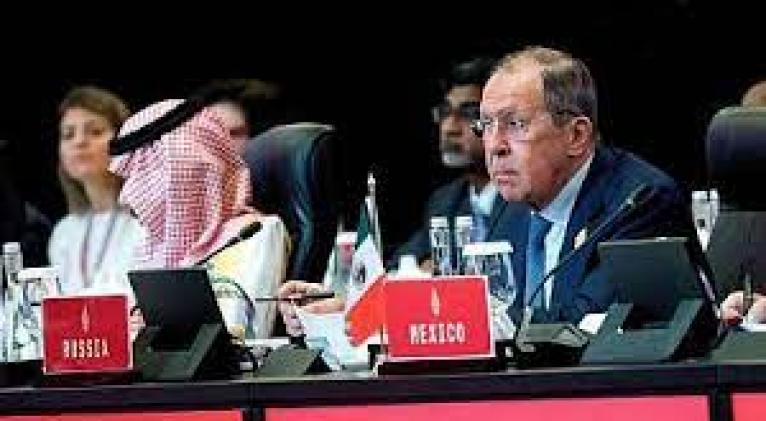Russia Condemns Western "Blackmail, Threats" At G20 Meeting
especiales

New Delhi: A G20 meeting in New Delhi on Thursday was in disarray after Russia accused the West of "blackmail and threats" against other countries.
India had wanted its G20 presidency this year to focus on issues such as alleviating poverty and climate finance, but Russia's war with Ukraine has so far crowded out other agenda items.
The meeting in New Delhi saw US Secretary of State Antony Blinken and Russian Foreign Minister Sergei Lavrov in the same room for the first time since July, but the two men were unlikely to hold talks.
The United States has accused China of considering supplying arms to its Russian ally, and Western delegates will use the foreign ministers' summit to discourage Beijing from intervening in the conflict.
But Russia issued a strongly worded statement following a meeting between Lavrov and Chinese counterpart Qin Gang on the sidelines of the G20 meeting.
"A unanimous rejection was expressed of attempts to interfere in the internal affairs of other countries, to impose unilateral approaches through blackmail and threats, and to oppose the democratisation of international relations," the Russian foreign ministry said.
Spanish Foreign Minister Jose Manuel Albares said Thursday that the Group of 20 meeting in India was unlikely to reach a common statement after comments by Lavrov.
"After the speech that we have seen from the minister of foreign affairs of Russia, I don't think that Russia is ready to accept an acceptable statement," Albares told reporters.
It was unclear what Lavrov told the closed-door meeting but the Russian foreign ministry said before his arrival that he would use the forum to lambast Western countries over the conflict.
"The destructive policy of the US and its allies has already put the world on the brink of a disaster," the ministry said Tuesday.
'Zero Evidence'
Blinken said he had no plans to meet either the Russian or Chinese foreign ministers at the G20 meeting.
The last time Blinken and Lavrov were in the same room, at a G20 meeting in Bali last July, the latter stormed out according to Western officials.
Blinken used his address to demand Moscow renew a UN-brokered deal to allow exports of Ukrainian grain, set to expire this month, which had helped reduce spiralling global food prices.
"Russia has deliberately and systematically slowed its pace of inspections, creating a backlog of ships that could be delivering food to the world today," he said, according to his prepared remarks.
Blinken had a fiery encounter with top diplomat Wang Yi last month in Germany after the United States shot down a suspected Chinese spy balloon over its east coast on February 4.
'Deep Global Divisions'
Opening the meeting Prime Minister Modi, who has refused to condemn Russia's invasion, called for the G20 to bridge differences over Ukraine.
"The experience of the last few years -- financial crisis, climate change, pandemic, terrorism and wars -- clearly shows that global governance has failed," PM Modi said.
"We are meeting at a time of deep global divisions... We all have our positions and our perspectives on how these tensions (can) be resolved. However, as the leading economies of the world, we also have a responsibility for those who are not in this room," he added.
French Foreign Minister Catherine Colonna called on the G20 to "respond clearly" to the war as it had during its Bali meeting last year.
The conflict was a "dirty war, waged in violation of all the laws of war and of simple humanity", she said in her address to the meeting.
A meeting of G20 finance ministers in Bengaluru last week failed to agree on a common statement after Russia and China sought to water down language on the war.
While India has not condemned the Ukraine invasion, PM Modi told Russian President Vladimir Putin last year this was "not a time for war", in comments seen as a rebuke to Moscow.














Add new comment